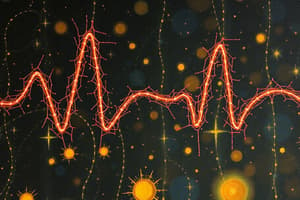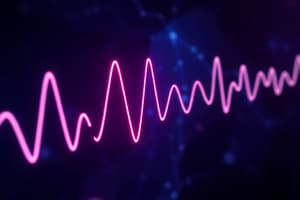Podcast
Questions and Answers
What characterizes depolarization in a neuron?
What characterizes depolarization in a neuron?
- Sodium channels inactivate immediately
- Membrane potential becomes more positive (correct)
- Voltage-gated potassium channels remain open
- Membrane potential becomes more negative than the resting state
Which of the following phases occurs immediately after the peak of an action potential?
Which of the following phases occurs immediately after the peak of an action potential?
- Repolarization (correct)
- Overshoot
- Hyperpolarization
- Resting state
What is the role of voltage-gated potassium channels during an action potential?
What is the role of voltage-gated potassium channels during an action potential?
- They allow potassium efflux for repolarization (correct)
- They open rapidly to initiate depolarization
- They close immediately after hyperpolarization
- They trigger graded potentials
Which statement about graded potentials is true?
Which statement about graded potentials is true?
What happens when the membrane potential reaches the threshold potential?
What happens when the membrane potential reaches the threshold potential?
What is the after-hyperpolarization phase characterized by?
What is the after-hyperpolarization phase characterized by?
Which gate of sodium channels opens in response to depolarization?
Which gate of sodium channels opens in response to depolarization?
What is generally the range of the resting membrane potential?
What is generally the range of the resting membrane potential?
Flashcards are hidden until you start studying
Study Notes
Resting Membrane Potential and Changes
- Resting membrane potential typically ranges from -60 to -90 mV, commonly around -70 mV.
- Depolarization occurs when the membrane potential becomes more positive.
- Overshoot is when the membrane potential exceeds zero during depolarization.
- Hyperpolarization refers to the membrane potential dropping below the resting state.
- Repolarization is the process of returning to the resting state after depolarization.
Action Potential Overview
- Action potential represents a rapid change in membrane potential crucial for cellular communication.
- Triggered by alterations in ion permeability, especially for sodium (Na+) and potassium (K+).
- Involves voltage-gated ion channels specific to sodium and potassium.
Graded Potentials
- Graded potentials are small, localized changes in membrane potential initiated by ligand binding, such as neurotransmitters.
- Excitatory graded potentials (e.g., sodium influx) result in depolarization.
- Inhibitory graded potentials (e.g., chloride influx or potassium efflux) cause hyperpolarization.
- The strength of graded potentials is proportional to the stimulus intensity, demonstrating a graded response.
- Signals experience decremental decay, with strength diminishing over distance from the stimulus site.
Threshold and Action Potential Generation
- Threshold potential is the membrane potential level that triggers an action potential due to graded potentials.
- At threshold, voltage-gated sodium channels rapidly open, causing a sharp depolarization (upstroke).
- Voltage-gated potassium channels open more slowly, facilitating potassium efflux for repolarization.
Ion Channel Dynamics
- Sodium channels contain two gates: the M-gate (activation gate) and the H-gate (inactivation gate).
- Sodium channels open in response to depolarization via the M-gate, then inactivate quickly through the H-gate to prevent further sodium influx.
- Potassium channels open more slowly than sodium channels, allowing potassium to exit the cell, promoting repolarization.
- Potassium channels remain open longer, leading to after-hyperpolarization, where the membrane potential temporarily becomes more negative.
Phases of Action Potential
- Resting state is maintained by potassium leak channels.
- During depolarization, voltage-gated sodium channels open, increasing membrane positivity.
- Repolarization occurs when sodium channels inactivate and potassium channels open.
- Hyperpolarization happens when potassium channels remain open briefly, resulting in a more negative membrane potential.
- Return to resting membrane potential occurs as potassium channels close, re-establishing resting conditions.
Key Testing Concepts for Pharmacy School
- Understanding ion permeability changes is critical during the action potential, specifically the roles of Na+ and K+.
- Recognizing the function of voltage-gated channels in depolarization and repolarization processes is essential.
- Differentiating between graded and action potentials, particularly the decremental nature of graded potentials, is important.
- The inactivation of sodium channels is crucial for the action potential cycle.
- Distinguishing the effects of excitatory and inhibitory neurotransmitters on membrane potential is vital for comprehending neuronal signaling.
- These concepts are foundational for understanding neuron and excitable cell signaling, relevant in physiology and pharmacology studies.
Studying That Suits You
Use AI to generate personalized quizzes and flashcards to suit your learning preferences.




